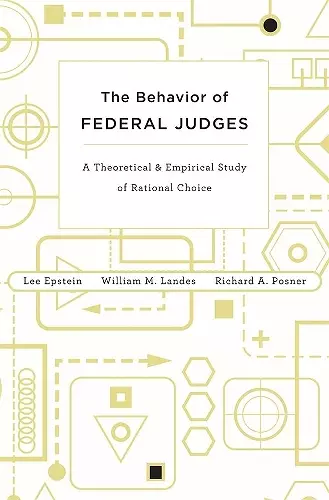The Behavior of Federal Judges
A Theoretical and Empirical Study of Rational Choice
Lee Epstein author Richard A Posner author William M Landes author
Format:Hardback
Publisher:Harvard University Press
Published:6th Feb '13
Currently unavailable, and unfortunately no date known when it will be back

The Behavior of Federal Judges has the potential to radically reorient the entire field of research into judicial behavior, one of the most exciting fields in law, economics, and political science. Epstein, Landes, and Posner go beyond the artificial divisions amongst these fields, and show how their different perspectives can be combined into a powerful model that not only makes enormous sense theoretically, but is backed by a mountain of data across all levels of the federal judiciary. I have little doubt that, in the years to come, this book will be seen as having begun a new type of scholarship on judicial behavior and institutions. -- Mitu Gulati, Duke University School of Law The Behavior of Federal Judges sets out to be the definitive book on the subject of judicial behavior. The authors establish a new mainstream in this exciting field-a unified model of judicial behavior that incorporates legal, economic, and political perspectives. There is no question that this book is a major work, providing both a benchmark and an agenda for future work. -- William H. J. Hubbard, University of Chicago Law School
Federal judges are not just robots or politicians in robes, yet their behavior is not well understood, even among themselves. Using statistical methods, a political scientist, an economist, and a judge construct a unified theory of judicial decision-making to dispel the mystery of how decisions from district courts to the Supreme Court are made.
Judges play a central role in the American legal system, but their behavior as decision-makers is not well understood, even among themselves. The system permits judges to be quite secretive (and most of them are), so indirect methods are required to make sense of their behavior. Here, a political scientist, an economist, and a judge work together to construct a unified theory of judicial decision-making. Using statistical methods to test hypotheses, they dispel the mystery of how judicial decisions in district courts, circuit courts, and the Supreme Court are made.
The authors derive their hypotheses from a labor-market model, which allows them to consider judges as they would any other economic actors: as self-interested individuals motivated by both the pecuniary and non-pecuniary aspects of their work. In the authors' view, this model describes judicial behavior better than either the traditional “legalist” theory, which sees judges as automatons who mechanically apply the law to the facts, or the current dominant theory in political science, which exaggerates the ideological component in judicial behavior. Ideology does figure into decision-making at all levels of the federal judiciary, the authors find, but its influence is not uniform. It diminishes as one moves down the judicial hierarchy from the Supreme Court to the courts of appeals to the district courts. As The Behavior of Federal Judges demonstrates, the good news is that ideology does not extinguish the influence of other components in judicial decision-making. Federal judges are not just robots or politicians in robes.
[The Behavior of Federal Judges] provides the most comprehensive and detailed empirical analysis yet of the role played by ideology and political affiliation in judicial decision making...It collects and analyzes a daunting amount of data. -- Adam Liptak * New York Times *
The most detailed and elaborate quantitative analysis of the federal judiciary to date... [The authors] show that the role of judicial ideology gets a lot bigger as we move up the judicial hierarchy...Epstein, Landes, and Posner have produced the best and most comprehensive study of judicial behavior by reference to quantitative measures and statistical analysis. Their book will almost certainly define the field for many years to come...Epstein, Landes, and Posner have performed an important service in establishing the truths, and the limits, of both legalism and realism. -- Cass R. Sunstein * New Republic *
Epstein, Landes, and Posner have written a brilliant book that ultimately shows the importance of the individual judge or justice to the outcome of cases. The Behavior of Federal Judges shows that who is on the bench matters enormously. It is a work that will shape discussions and research about the federal courts for many years to come. -- Erwin Chemerinsky * Judicature *
The Behavior of Federal Judges has the potential to radically reorient the entire field of research into judicial behavior, one of the most exciting fields in law, economics, and political science. Epstein, Landes, and Posner go beyond the artificial divisions amongst these fields, and show how their different perspectives can be combined into a powerful model that not only makes enormous sense theoretically, but is backed by a mountain of data across all levels of the federal judiciary. I have little doubt that, in the years to come, this book will be seen as having begun a new type of scholarship on judicial behavior and institutions. -- Mitu Gulati, Duke University School of Law
The Behavior of Federal Judges sets out to be the definitive book on the subject of judicial behavior. The authors establish a new mainstream in this exciting field—a unified model of judicial behavior that incorporates legal, economic, and political perspectives. There is no question that this book is a major work, providing both a benchmark and an agenda for future work. -- William H. J. Hubbard, University of Chicago Law School
ISBN: 9780674049895
Dimensions: unknown
Weight: unknown
440 pages